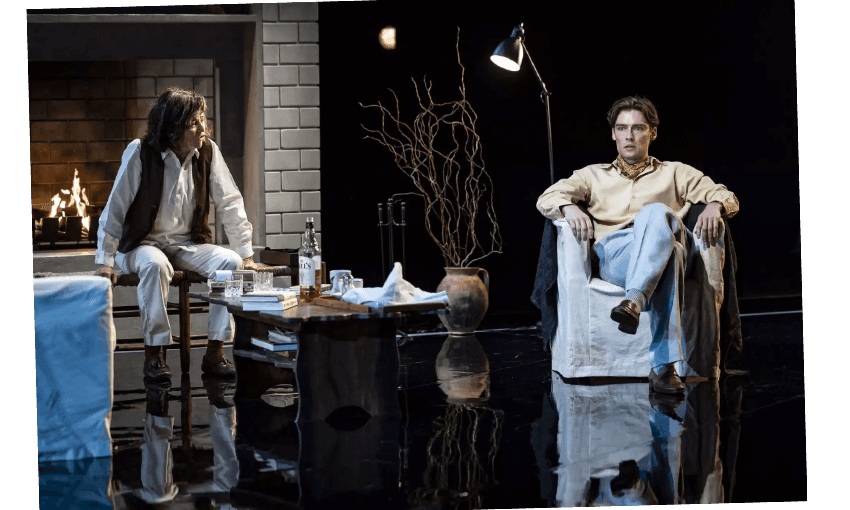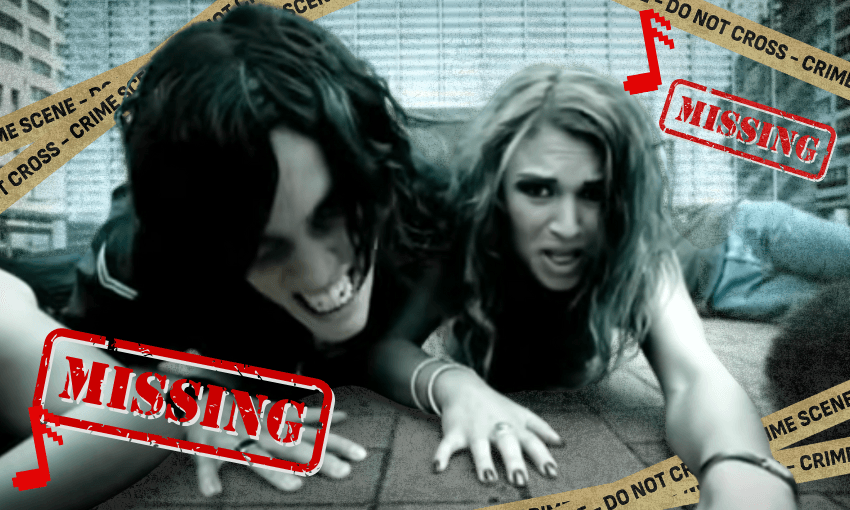Sam Brooks reviews Auckland Theatre Company’s Switzerland, which can’t quite meet its subject straight in the eye.
What is it?
The last show in Auckland Theatre Company’s programme is somewhat of a pivot from the rest of its programme this year. It’s a psychological thriller by an Australian playwright (Joanna Murray-Smith) about an American author of psychological thrillers (Patricia Highsmith) played by a New Zealander (Sarah Peirse) set in Switzerland (Switzerland).
The two-hander, which also stars Jared Blakiston, places the twentieth century’s most notorious thriller writer at the centre of one another writer’s devising. Highsmith is holed up in her Switzerland chalet, boozing and being as unpleasant as history remembers her, when one of the lower rung staff (Blakiston) at her publisher arrives, ostensibly to corral her to sign a contract to write another Ripley novel.
While Switzerland might be an effective thriller, there’s a hollowness at its core that gets larger and larger as the play unravels, until the play’s heart is as black and empty as the many voids onstage.
The good
A thriller, especially a two-hander, lives and dies on the strengths of its performances. Switzerland is blessed with two performers who are well up to the task of delivering it. Stage magic, which this show has relatively little of, can only take the audience so far. When the stakes are life and death, if the actors don’t buy into it, then a ticketholder won’t either. Peirse and Blakiston nail this, bringing tension to the cavernous set, which looks less like a living room and more like a particularly gothic front window display.
Peirse is saddled with two main challenges. She has to play the truth of Highsmith that the audience member with a glancing familiarity of the author might already know: the bracing bark of a hybrid American accent, the stooped posture, the spiky unapproachability. This challenge she handles especially well. She’s not a dead ringer for Highsmith, and thankfully we don’t expect her to be, but she sells the play’s version of the author with as much verve as she possibly can.
The other challenge, as is often the case with biographical plays, is that she has to deliver a lot of exposition. Highsmith’s awards, stature, and even other authors’ quotes about her are dropped into dialogue like anvils falling from the lighting rig, but Peirse volleys them off like they’re tennis balls. It’s only due to her talent that it feels, even for a moment, like we’re watching Patricia Highsmith rather than watching an overqualified reading of the Patricia Highsmith Wikipedia page.
It’s telling that where Peirse is best are the moments where Highsmith, the real-life person edited and crafted into shape for fiction’s sake, falls away and she can play at a real human truth. It might be a bit simple, even for a psychological thriller, that a sense of loneliness and inadequacy is at the root of Highsmith’s irascibility, but when Peirse can tap into that, it’s as electric as any moment of physical peril. When Highsmith excitedly talks about the weapons she’s collected over the years, Peirse seems to float about the stage in intellectual euphoria, and definitely above the page she’s drawing from.
On the other hand, Blakiston is flat-out superb, holding his own against his established co-star. The role requires him to not just hold the tensions of the show, but play a multitude of paper-thin surfaces and barely plausible deceptions, so that there is a constant threat lying underneath the punchlines being thrown around the set. Indeed, he’s so brilliantly cast that it threatens to blow the conceit of the show wide open from the start.
It’s unfortunate then, that Joanna Murray-Smith’s play often feels less like a platform for the actors to spring from, and more like a weight around their shoulders.
The not-so-good
Biographical plays are a hard sell. The lives of real people do not easily fit into a classic three-act structure, and too often the need to make sure every historical fact about a certain person or situation is included so that the audience fully understands what’s going on. “Including every historical fact” is not generally conducive to engaging drama, so these plays can fall into the trap of having actors in convincing wigs putting on accents to play characters who spend an awful lot of time recounting their history to other characters who already know it.
Switzerland is, in particular, a strange take on the biographical play. Firstly, it didn’t actually happen. Secondly, it takes a genre author and places her within the genre she had such a clear mastery of. Thirdly, and most crucially, it reduces Patricia Highsmith to a character that, despite Peirse’s efforts, doesn’t much resemble the author.
Highsmith is one of the most fascinating authors of the 20th century. She was beloved outside of the United States, but within her own country her reputation never reached the likes of her contemporaries, Norman Mailer et al. She was a queer author who only put her name to her own lesbian work of fiction three decades after its release. She was openly racist, anti-semitic and notoriously hostile to her peers.
Those are fascinating qualities to behold in a human, and for a playwright to attempt to reconcile. Instead, Murray-Smith’s play takes the easy, low road, even contradicting itself. Early on, Highsmith says that she never talks about her own writing, in earnest, and then proceeds to almost exclusively talk about her own writing and career. As a character, her lens is limited to what she can say about herself.
Similarly, Highsmith’s complexity is never shown to us, but told. She tells us she is racist. She tells us about how she is appreciated outside her own country. She tells us about her love for cats, snails and various, deeply specific kinds of foods. Instead of trying to interrogate what makes one of the most interesting and complicated authors of the last century tick, she is reduced to a latter-day Maggie Smith character, volleying off irascible punchlines and musings about the craft of writing.
Ultimately, Patricia Highsmith is at the centre of a thriller that doesn’t come close to meeting the brilliance of the ones she wrote. She’s robbed of the complexity that she gave to her own characters, the brilliance and light touch she gave to her plotting, and most upsettingly, the strength of her own twisted convictions. Highsmith, and the audience, deserve better.
The verdict
As a thriller, taken on its own merits, Switzerland is good. If you don’t know who Patricia Highsmith is – and a bleak amount of people I’ve spoken to since seeing it didn’t realise that the show was about a real person, even after the show – then you’ll probably have a good, if slightly confusing, time.
If you do, however, Switzerland misses the mark. There’s a hole in the middle of this play where a great thriller – with depth, with spike, with a beating black heart – should be. Highsmith might be there in name, but her spirit remains firmly on the shelf, in her own work.
Switzerland runs at the ASB Waterfront Theatre until October 7.



